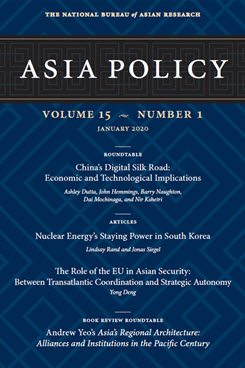The Role of the EU in Asian Security
Between Transatlantic Coordination and Strategic Autonomy
This article examines the struggles of the European Union and the principal European powers to define their security role in Asia and considers the implications for transatlantic cooperation.
EXECUTIVE SUMMARY
MAIN ARGUMENT
Lack of coordination on Asian security has frequently surprised and frustrated policymakers on both sides of the Atlantic. In several high-stakes instances, such as the EU states’ dual-use technology sales to China, participation in the Asian Infrastructure Investment Bank, and reactions to the international tribunal ruling on the South China Sea, the EU seemed to have acted against U.S. policy. The transatlantic alliance has been largely lost in the U.S. pivot and Indo-Pacific strategy. Despite historical dominance, Europe today has limited presence and capacity in the Asia-Pacific region. While the security threats from Asia are hardly existential for the EU or European powers, their economic interests in a connected Eurasia are fast-growing. The EU and its states have long preferred multilateralism and engagement over hard-power logic, which is evident in how they have traditionally dealt with China. But in light of the crisscrossing challenges posed by Asia’s rise, Europe can no longer stay above the fray and must assert a role in an evolving Asia-Pacific.
POLICY IMPLICATIONS
- Europe’s role in Asia has come to a crossroads as it grapples with the new geopolitical and geoeconomic realities of Eurasian connectivity. The crux of the matter is to find the right balance between its traditional alliance with the U.S. and the new imperative for strategic autonomy on Asian issues.
- As Europe occupies a pivotal position in the evolving Asian order, careful management of the transatlantic alliance is needed more than ever. Policymakers on both sides should be mindful of the limited European presence in Asia as well as approaches that are distinct from those of the U.S.
- The EU and European leaders should think strategically about how to best leverage Europe’s unique strengths and visions for an effective role that sustains a rules-based order while managing great-power politics in Asia.
Yong Deng is a Professor of Political Science at the U.S. Naval Academy in Annapolis, Maryland.
About Asia Policy
Asia Policy is a peer-reviewed scholarly journal presenting policy-relevant academic research on the Asia-Pacific that draws clear and concise conclusions useful to today’s policymakers. Asia Policy is published quarterly in January, April, July, and October and accepts submissions on a rolling basis. Learn more


